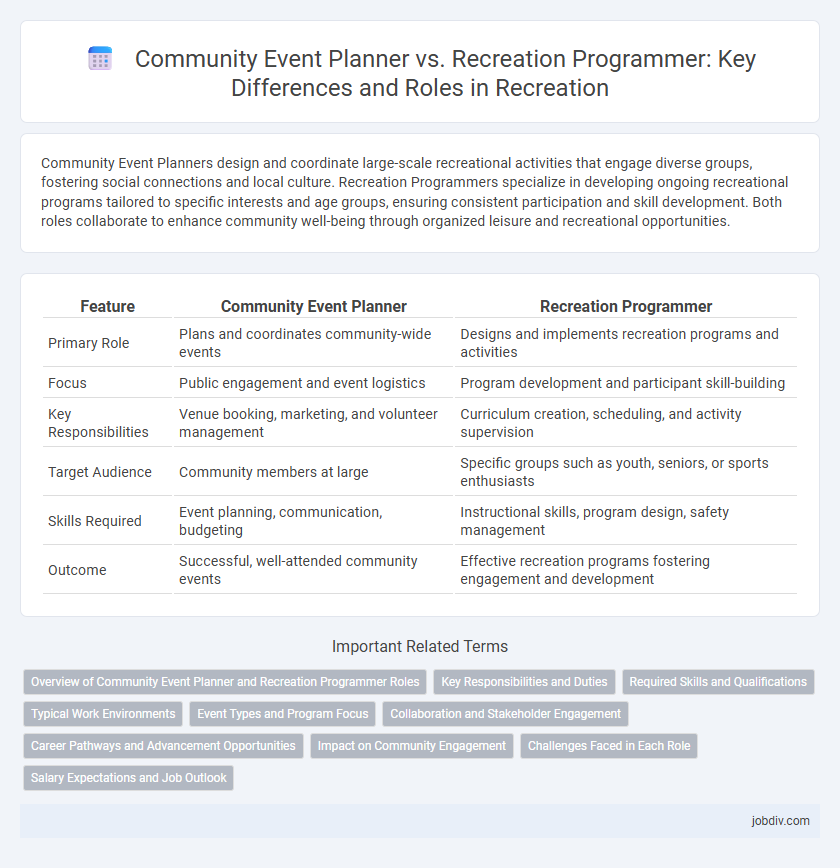Community Event Planners design and coordinate large-scale recreational activities that engage diverse groups, fostering social connections and local culture. Recreation Programmers specialize in developing ongoing recreational programs tailored to specific interests and age groups, ensuring consistent participation and skill development. Both roles collaborate to enhance community well-being through organized leisure and recreational opportunities.
Table of Comparison
| Feature | Community Event Planner | Recreation Programmer |
|---|---|---|
| Primary Role | Plans and coordinates community-wide events | Designs and implements recreation programs and activities |
| Focus | Public engagement and event logistics | Program development and participant skill-building |
| Key Responsibilities | Venue booking, marketing, and volunteer management | Curriculum creation, scheduling, and activity supervision |
| Target Audience | Community members at large | Specific groups such as youth, seniors, or sports enthusiasts |
| Skills Required | Event planning, communication, budgeting | Instructional skills, program design, safety management |
| Outcome | Successful, well-attended community events | Effective recreation programs fostering engagement and development |
Overview of Community Event Planner and Recreation Programmer Roles
Community Event Planners coordinate and manage public events, focusing on logistics, vendor relations, and community engagement to ensure successful gatherings. Recreation Programmers design and implement structured recreational activities and programs that promote physical health, social interaction, and skill development across diverse populations. Both roles require strong organizational skills, but Event Planners emphasize event execution while Recreation Programmers prioritize program development and participant outcomes.
Key Responsibilities and Duties
Community Event Planners coordinate logistics for local events, manage vendor relationships, and ensure compliance with regulations to create engaging experiences for the public. Recreation Programmers design, implement, and oversee recreational activities and programs tailored to community needs, focusing on participant engagement and wellness. Both roles require strong organizational skills but differ in scope, with planners emphasizing event coordination and programmers concentrating on ongoing recreational service delivery.
Required Skills and Qualifications
Community Event Planners require strong organizational skills, proficiency in project management, and excellent communication abilities to coordinate logistics and engage diverse groups effectively. Recreation Programmers must possess expertise in activity planning, knowledge of recreational therapy or physical education, and skills in budgeting and facility management to develop and implement programs that promote wellness and social interaction. Both roles demand problem-solving aptitude, leadership capabilities, and a background in event coordination or recreational services, often supported by relevant certifications or degrees in event planning, recreation, or related fields.
Typical Work Environments
Community Event Planners typically work in dynamic environments such as municipal centers, non-profit organizations, and cultural institutions where they coordinate public gatherings and festivals. Recreation Programmers often operate within parks and recreation departments, fitness centers, and community centers, designing and implementing activity schedules for diverse age groups. Both roles demand collaboration with local stakeholders and adaptability to various public settings to enhance community engagement and participation.
Event Types and Program Focus
Community event planners primarily organize large-scale public events such as festivals, parades, and community fairs that foster social engagement and local culture. Recreation programmers focus on designing ongoing activities and classes like sports leagues, fitness programs, and arts workshops to promote individual wellness and skill development. Both roles require collaboration with local organizations but differ in event frequency and target audience engagement.
Collaboration and Stakeholder Engagement
Community Event Planners and Recreation Programmers collaborate closely to design and implement engaging activities that meet the diverse needs of local residents. Effective stakeholder engagement involves coordinating with community groups, local businesses, and municipal agencies to ensure events and programs are well-supported and inclusive. This partnership enhances resource sharing, promotes community involvement, and fosters a cohesive recreational environment.
Career Pathways and Advancement Opportunities
Community Event Planners specialize in organizing public gatherings and local festivals, gaining skills in vendor coordination and marketing that facilitate advancement to senior event coordinator or community engagement manager roles. Recreation Programmers focus on developing activity schedules for parks and recreational centers, enhancing expertise in program development and participant assessment to progress toward supervisory or recreation director positions. Both career paths offer opportunities for growth through certification and specialized training in event management or therapeutic recreation.
Impact on Community Engagement
Community Event Planners drive engagement by organizing large-scale events that foster social interaction and cultural celebration, directly boosting community participation and cohesion. Recreation Programmers design ongoing activities and classes that develop sustained interest and personal well-being, encouraging regular involvement and long-term community connection. Both roles significantly enhance community engagement through complementary approaches--one through dynamic event facilitation and the other through continuous recreational offerings.
Challenges Faced in Each Role
Community event planners often grapple with coordinating diverse stakeholders, managing budget constraints, and ensuring high community engagement amid competing local interests. Recreation programmers face challenges in designing inclusive and accessible programs that meet varied demographic needs while adapting to evolving health and safety regulations. Both roles require strategic problem-solving to balance resource limitations with the goal of maximizing participant satisfaction and community impact.
Salary Expectations and Job Outlook
Community Event Planners typically earn an average salary ranging from $45,000 to $65,000 annually, with job growth projected at 8% over the next decade due to increasing demand for organized social activities. Recreation Programmers often have salaries between $40,000 and $60,000, experiencing similar job outlook trends driven by rising public interest in recreational and wellness programs. Both roles benefit from expanding community engagement initiatives, resulting in steady employment opportunities and competitive salary prospects.
Community Event Planner vs Recreation Programmer Infographic

 jobdiv.com
jobdiv.com